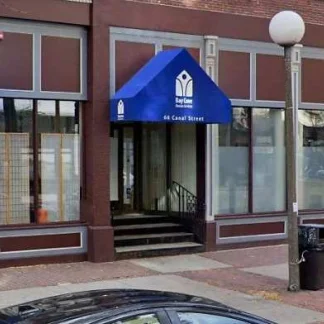Andrew House
Andrew House is a non-profit treatment facility located in Jamaica Plain, MA. An...
Bay Cove Treatment Center for Opiate Addictions provides services for those struggling with opiate addiction. Services include medication, individual and group therapy. Bay Cove Treatment Center for Opiate Addictions Boston, Massachusetts.
Bay Cove Treatment Center for Opiate Addictions believes that drug addiction is a medical condition that needs an effective and individualized treatment that perfectly fits the unique needs of the individual who wants to recover. They also believe that individuals with drug addiction can recover and live productive and sober lives.
Patients are required to attend individual and group sessions weekly. The group therapy include a variety of topics to address the needs of the clients, they include parenting issues, family support, eliminating cocaine usage, gaining self esteem, Women’s health issues, HIV/AIDS education and much more.
Additionally they offer specialized groups including a program for pregnant and parenting women and another for dually-diagnosed with both mental health and substance abuse. The program for pregnant women include daily counseling, nurse or case manager to monitor a variety of issues including housing and nutrition issues.
For dually diagnose individuals, the program include assessment and referrals, support groups and psychotropic medication to help with the mental health symptoms, additionally to the methadone stabilization.
Contact us for more information: (617) 371-3030

Connect with Bay Cove Treatment Center for Opiate Addictions by calling their admissions team directly.
(617) 371-3030 Website Get DirectionsThe Substance Abuse and Mental Health Services Administration (SAMHSA) is a branch of the U.S. Department of Health and Human Services. Established in 1992 by congress, SAMHSA's mission is to reduce the impact of substance abuse and mental illness on American's communities.
SAMHSA Listed: Yes
Group therapy is any therapeutic work that happens in a group (not one-on-one). There are a number of different group therapy modalities, including support groups, experiential therapy, psycho-education, and more. Group therapy involves treatment as well as processing interaction between group members.
In individual therapy, a patient meets one-on-one with a trained psychologist or counselor. Therapy is a pivotal part of effective substance abuse treatment, as it often covers root causes of addiction, including challenges faced by the patient in their social, family, and work/school life.
Trauma therapy addresses traumatic incidents from a client's past that are likely affecting their present-day experience. Trauma is often one of the primary triggers and potential causes of addiction, and can stem from child sexual abuse, domestic violence, having a parent with a mental illness, losing one or both parents at a young age, teenage or adult sexual assault, or any number of other factors. The purpose of trauma therapy is to allow a patient to process trauma and move through and past it, with the help of trained and compassionate mental health professionals.
In individual therapy, a patient meets one-on-one with a trained psychologist or counselor. Therapy is a pivotal part of effective substance abuse treatment, as it often covers root causes of addiction, including challenges faced by the patient in their social, family, and work/school life.
Trauma therapy addresses traumatic incidents from a client's past that are likely affecting their present-day experience. Trauma is often one of the primary triggers and potential causes of addiction, and can stem from child sexual abuse, domestic violence, having a parent with a mental illness, losing one or both parents at a young age, teenage or adult sexual assault, or any number of other factors. The purpose of trauma therapy is to allow a patient to process trauma and move through and past it, with the help of trained and compassionate mental health professionals.
Trauma therapy addresses traumatic incidents from a client's past that are likely affecting their present-day experience. Trauma is often one of the primary triggers and potential causes of addiction, and can stem from child sexual abuse, domestic violence, having a parent with a mental illness, losing one or both parents at a young age, teenage or adult sexual assault, or any number of other factors. The purpose of trauma therapy is to allow a patient to process trauma and move through and past it, with the help of trained and compassionate mental health professionals.
Andrew House is a non-profit treatment facility located in Jamaica Plain, MA. An...
Roxbury Comprehensive New Directions Program is a private rehab located in Bosto...
Somerville Mental Health Association is a private rehab located in Somerville, M...
Community Health Care offers outpatient treatment for individuals dealing with o...